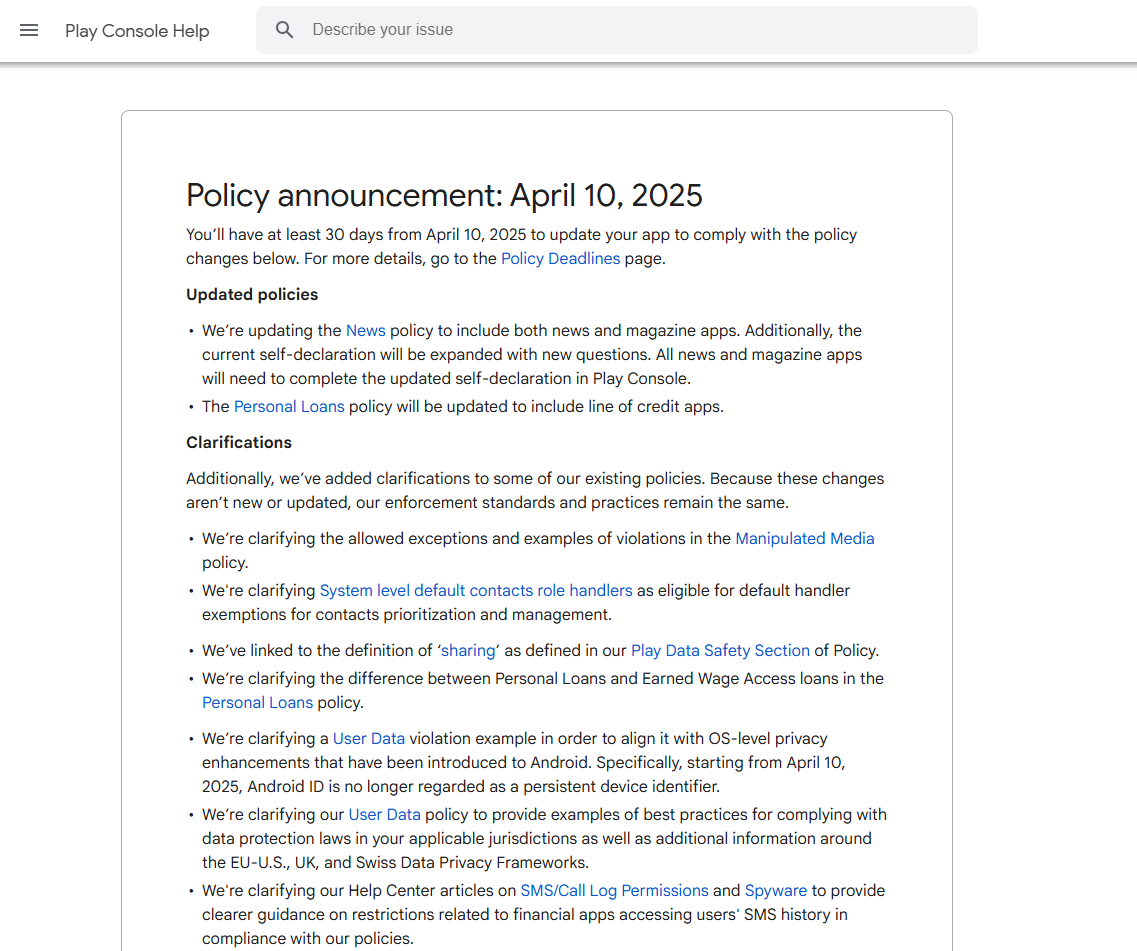On April 10, 2025, Google Play rolled out major policy updates targeting several flagged categories, including news and magazine apps, financial services (especially loan apps), and social or dating platforms. Key updates include:
-
Tighter compliance requirements: Developers must now complete more detailed self-declaration forms, undergo stricter data privacy audits, and justify every permission request more clearly.
-
End of Android ID: Android ID has been officially deprecated as a permanent device identifier, which disrupts ad tracking and attribution models widely used by developers.
These changes require not only technical updates but also strategic shifts for developers who rely on ad monetization and traditional store distribution.

The Hidden Costs of Compliance: Is Google Play Still Worth It?
Though framed as efforts to “protect the ecosystem,” these updates place a heavy burden on developers:
-
Operational instability: App suspensions, takedowns, and attribution breakdowns—often stemming from vague or evolving policies—are increasingly common in finance and content-focused apps.
-
SDK-related risks: Third-party SDKs remain one of the leading causes of policy violations, even when developers follow guidelines.
For many teams—particularly startups and companies focused on global scale—this raises a serious question: Are alternative distribution channels more secure and sustainable?
Looking Beyond Google Play: W2A vs. PWA
W2A (Web-to-App): A Temporary Fix, Not a Long-Term Solution
W2A converts web content into APKs for Android distribution. It’s quick to deploy but comes with limitations:
-
Still tied to the Play Store: APK distribution often still involves submission to the store, exposing apps to the same policy enforcement risks.
-
User experience compromises: Load times and overall performance tend to lag behind native or PWA alternatives.
PWA (Progressive Web App): The Policy-Proof Alternative
PWAs, built entirely with web technologies, offer a fundamentally different approach:
-
No app store dependency: Distribute apps with a promotional link through SMS, social media, or your own site—no approvals, no takedown threats.
-
Native-like performance: Instant loading, offline capabilities, and seamless updates deliver a smooth user experience.
-
Attribution support: Tools like ROIBest’s PWA solution can track and deduplicate traffic across platforms—ensuring measurable growth & maximized ROI.
Why PWA is the Smarter Long-Term Bet
For growth-oriented teams dealing with tightening platform rules, PWAs offer clear advantages:
-
Bypass platform scrutiny: Scale globally without being subject to app store reviews.
-
Avoid APK issues: No more chasing version updates or stock lock-in.
-
Combine speed and insights: Enjoy fast performance and track ROI with precision.
As Google’s ecosystem becomes more restrictive, PWAs give developers back control over how they distribute, engage, and grow.
W2A might work as a short-term workaround, but for teams thinking long-term, advanced PWA solutions—like those from ROIBest—offer the most reliable, scalable, and policy-resilient path forward. In an era of increasing platform limitations, flexibility and ownership are more important than ever.


